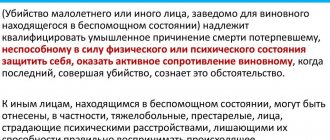In criminal law there is the concept of retroactive force of criminal law. It means that the adoption of a law providing for the mitigation of punishment under a certain article of criminal law, its complete abolition or changing the conditions of conviction, applies not only to citizens who committed a crime after its adoption, but also to those in respect of whom investigative actions are still underway or a decision has been issued. sentence of imprisonment.
The norm is a direct consequence of the implementation of humanism in criminal cases. A conflict of laws arises; the actions of the accused are classified differently when committing an act and when sentencing. The rule of law is subject to application, sanctions under similar articles of which are better for the position of the accused, without taking into account what rule was in force then and now. The adopted legal act leads to the abolition of criminal prosecution for the specified act if it has ceased to be criminal in nature.
Multi-channel free hotline Legal advice on criminal law. Every day from 9.00 to 21.00
Moscow and region: +7 (495) 662-44-36
St. Petersburg: +7 (812) 449-43-40
When has
I agree with the provisions of Art. 45 Part 1 of the Constitution of the Russian Federation, the rights of both persons under investigation and those with a guilty verdict are equal.
The legislation of the Russian Federation provides for cases in which the retroactive force of the law in criminal law is applied.
These include:
- Adoption of a new law that eliminates the crime in its essence, that is, decriminalizing it.
- Adoption of a new law mitigating punishment.
- Adoption of a new law that improves the situation of already convicted citizens.
In the Criminal Practice of the Russian Federation, a large number of crimes were decriminalized after the adoption of the Criminal Code of the Russian Federation in 1996. About 70 crimes under the RSFSR code were abolished. For example, punishment for failure to report, violation of state price discipline, engaging in prohibited types of individual activities, etc. is completely excluded.
As a result of the adoption of a new regulatory legal act (NLA), the act will change from criminal to administrative with the application of sanctions of the Code of Administrative Offenses of the Russian Federation, for minors the age of criminal prosecution under a specific article will change, and an adjustment to the elements of the crime will be made.
For a number of articles, the prescribed punishment may be mitigated. The new law reduces the limits of the term provided for serving the sentence, softens it, and cancels additional sanctions. For example, in Art. 206 of the Criminal Code of the RSFSR provided for criminal liability for damage to property in public transport. The analogue was Art. 214 of the Criminal Code of the Russian Federation - vandalism. The punishment was previously harsher and all sentences were subject to commutation with a reduction in the upper limit of the punishment.
Acts may be excluded from the Special Part of the Criminal Code of the Russian Federation and included in the General Part. Sometimes the reverse process occurs. If, when an article is reclassified, the punishment for it is provided to a lesser extent than in the previously valid wording, we are talking about partial decriminalization.
Often we are talking about reducing responsibility, which happened with the possibility of arresting a minor. Reducing the number of persons who cannot be sentenced to life imprisonment becomes the basis for commuting the sentence. Newly adopted legal acts often establish a more lenient regime for keeping criminals in colonies.
To understand whether a criminal law has retroactive force, it is necessary to study its new editions and those in force at the time of the act committed. If the fact of a change in legal acts is revealed, we are talking about applying a more lenient article.
By virtue of Article 10 of the Criminal Code of the Russian Federation, this force of criminal law extends its effect to two categories of citizens who have common qualities:
- persons who committed a crime, but at the time of the verdict the rule of law under the incriminated article changed (simple retroactive effect);
- convicts serving a sentence whose sentence has officially entered into force. In this case, the retroactive force of the law can be called revisionary.
In relation to each group, the retroactive force of the law operates with its own procedural features.
If a process or investigation is underway, the incriminated article under which, after the initiation of a criminal case, is decriminalized, then it is closed at any stage, since such an act has become absent from the list of criminal offenses. Convicts are subject to release. There are differences when the rule of law is partially changed. In the first case, the judge passing the sentence reclassifies the article during the legal proceedings.
To understand whether each adopted criminal law has retroactive force, one must look at the history of its amendments. The changed legal regulation, which implies a more serious measure of liability, does not apply to earlier cases.
The investigation of a crime is related to the criminal procedure law. Article 4 of the Code of Criminal Procedure of the Russian Federation stipulates that the case is subject to consideration according to the standards in force at the time the case is considered in court. However, numerous Determinations of the Constitutional Court indicate that all conflicts of law must be resolved in favor of the accused. To the question of whether the criminal procedure law in the country has retroactive force, the Determination of July 10, 2013 No. 270-O clarifies that the Criminal Code and the Code of Criminal Procedure of the Russian Federation are mutually related. Therefore, the possibility of giving retroactive effect to all acts that improve the situation of the convicted person is not excluded. The full version of the Supreme Court decision can be viewed using the Legal Consultant system.
Second commentary to Art. 10 of the Criminal Code of the Russian Federation
1. The retroactive force of a criminal law should be understood as the extension of its effect to acts committed before the law came into force. The criminal law has retroactive effect in the following cases: the criminality of the act is eliminated; mitigation of punishment or otherwise improving the situation of the person who committed the crime.
2. The criminality of an act can be eliminated by: decriminalization, i.e. exclusion of the act from the list of criminal offenses; introduction of additional conditions of criminal liability (for example, at least one more constructive element of the crime is added to the basic structure); amendments to the General Part of the Criminal Code (for example, increasing the age of criminal responsibility, etc.).
The punishment can be mitigated by introducing amendments to both the General and Special parts of the Criminal Code. For example, by lowering the lower or upper amount of punishment in the articles of the General or Special Parts of the Criminal Code; introducing or expanding the circle of persons to whom this punishment cannot be applied, or reducing the amount of wage withholding during correctional or forced labor; replacing criminal sanctions with more lenient punishments.
The situation of a person who has committed a crime can otherwise improve, for example, by: reducing the terms of expungement of a criminal record or the terms that must actually be served in order to be released on parole from serving a sentence, or by replacing the imposed punishment with a more lenient one, or by changing punishment execution regime.
3. The retroactive force of a criminal law may apply to: persons who committed a crime before the criminal law came into force; for persons serving a sentence or who have served a sentence but have a criminal record.
What criminal law has this force?
The second part of Article 10 of the Criminal Code of the Russian Federation directly indicates reductions in the punishment already imposed by the court when the law is changed.
Doubts arise if the new law contains both measures mitigating the sentence and tightening additional sanctions. Then they talk about the partial retroactive force of the law.
In general terms, it looks like this: A. Accused of a crime for which at the time of the act he could have been given 4 to 6 years of restriction of freedom. In the process of investigative measures under the newly adopted version of the law, he may be given a sentence of 2.5 to 9 years. The court, when making a decision, may reduce the lower limit to 2.5 years, but the upper limit will remain at 6 years.
The numerous complaints from convicts about the incorrect use of the rule of law during the review of their cases led to the adoption of Resolution of the Constitutional Court of April 20, 2006 No. 4-P. The goal was to check compliance with the Constitution of the Russian Federation, Part 2 of Art. 10 of the Criminal Code of the Russian Federation. Takes into account frequently occurring, widespread problems, the general issue of which is related to the application of Part 1 of Art. 10 of the Criminal Code of the Russian Federation, an explanation is given for its law enforcement practice.
It is easy to understand which criminal laws of the country have retroactive effect for convicted citizens. All sentences are subject to revision if the articles used in them are changed in the direction of improving the situation of the convicted person or reducing the term.
The applicant applies to a court of general jurisdiction. The essence of the appeal is to bring the sentence passed in accordance with the version of the Criminal Law in force at the time of filing the appeal, and not at the time of its delivery. However, when making a verdict in a case, the court takes into account two sides of the process. Restriction of freedom is a measure of punishment necessary to restore justice and atone for guilt. Punishment cannot be reduced so much that it loses its meaning.
Review of the case by cassation or appeal leads to a mandatory investigation by the court of the issue of adopting a new version of the article of the law.
It can manifest itself in different aspects:
- exempt from punishment, since the crime has ceased to be criminal. Occurs as determined by the court. Jurisdiction is determined by the place of actual residence of the person. The initiator is both the convict himself and the prosecutor, the supervisory commission of the administration of the correctional institution;
- release from punishment for the reason that the term of imprisonment served is higher than the maximum possible under the specified article in the new version of the law;
- replacing the conditions of serving a sentence with more lenient ones, for example, by introducing the concept of deferment due to the presence of a young child;
- the emergence of grounds for changing the measure of responsibility from actual deprivation of liberty to others;
- expansion of parole conditions;
- reduction of criminal record.
In practice, court decisions turn out to be complex and unpredictable. The most acute question arises if the new article contains both a promise to mitigate the punishment and to increase it.
Types of laws that have retroactive effect
The effect of criminal norms justifying the review of sentences can be expressed:
- Complete decriminalization of the crime.
- Partial decriminalization of the act.
- Depenalization (mitigation of punishment).
- Improving the position of the perpetrator in another way.
Decriminalization of crime
Additional information
In a separate article we will look at an example of decriminalization of domestic battery. Currently, punishment for beatings, including beatings of family members, is provided for in two articles: Art. 6.1.1 Code of Administrative Offenses - for a violation committed for the first time and Art. 116.1 of the Criminal Code - for repeated beatings inflicted within a year after the previous ones.
A crime is not qualified under an article of the criminal code if the law:
- Transfers the act to the section of administrative offenses, as was the case with:
- unintentional infliction of moderate damage;
- insult;
- deliberately false advertising;
- smuggling of goods;
- leaving the scene of an accident.
- Increases the age at which the perpetrator is brought to criminal responsibility or removes the act from the list of crimes for which minors are punished.
- Reduces the number of subjects, including special ones, subject to punishment.
- Makes adjustments to the concept of insanity in criminal law, an expanded interpretation of which, taking into account age characteristics, is given in Art. 20 CC.
- Limits the territory in which the actions of the perpetrator will be classified as a crime.
- Excludes the subject of the crime from the list of subjects of the assault. From a similar list given in Art. 222, civilian firearms along with ammunition were excluded.
- Changes the criteria for the subject of the crime. In the case of mediation in bribery, it will be recognized as a criminal offense if the amount of the bribe exceeds 25 thousand rubles.
- Removes certain actions involving the subject of a crime from the Criminal Code. Thus, the illegal purchase and carrying of gas and bladed weapons were decriminalized by Federal Law No. 162 of December 8, 2003. More information about the illegal carrying of bladed weapons can be read in this article https://lexconsult.online/9091-otvetstvennost-za-nelegalnoe-noshenie- oruzhiya
- Introduces clarifications regarding the elements of the crime. For example, to recognize an act as criminal, the presence of a selfish motive or the occurrence of certain consequences will be required.
Partial decriminalization of a criminal article
The retroactive effect of a law in criminal law also applies to provisions that partially decriminalize a crime. This happens in the following cases:
- Limitations of the crime.
- Changes in Positive Law, which is referred to in the blanket disposition of the criminal article. For example, the law may exclude certain types of business activities from the list of those requiring a mandatory license. Accordingly, engaging in this type of business will not be qualified under Art. 171 CC.
- Exclusion of an act from the Special Part of the Criminal Code, but preserving its characteristics in the General Part. Thus, for deceiving consumers, the perpetrators are prosecuted not under Art. 200 of the Criminal Code (Federal Law No. 162 of December 8, 2003), and under Art. 159 of the Criminal Code for theft of someone else’s property through fraudulent actions.
- Introducing a special norm into the Criminal Code establishing liability for an act that is also mentioned in the General Part. In this case, the punishment may not necessarily be reduced, but also increased. In the second option, the adopted norm will not have retroactive effect.
Depenalization
Mitigation of liability occurs when:
- Exclusion of a certain preventive measure from the punishment system. This happened with the confiscation of property (Federal Law No. 162 of December 8, 2003) and with the arrest of minors (Federal Law No. 377 of December 27, 2009).
- Expanding the circle of persons not subject to life imprisonment or limiting the grounds for applying this measure.
- Reducing the lower and upper limits of punishment.
- Including new data in the list of mitigating circumstances or reducing the list of aggravating circumstances.
- In other cases.
A candidate of legal sciences will tell you about the cases in which the criminal law has retroactive effect:
Other cases of improvement
The law, which has retroactive effect and changes the situation for the better for the convicted person, concerns:
- Conditions of serving in places of deprivation of liberty. For example, even in the event of a relapse, a woman is not subject to serving a sentence in a high-security correctional colony (Article 58 of the Criminal Code).
- Limitation periods for criminal prosecution and execution of sentences.
- Grounds for parole.
- Other circumstances.
Case Study
The judicial practice of the Russian Federation has an extensive collection of examples of sentences passed, appeal rulings of courts that used Art. 10 of the Criminal Code of the Russian Federation to mitigate the sentence for the accused.
According to the verdict of the Central District Court of Sochi dated October 30, 2017, Gavinchuk E.A. She committed robbery by prior conspiracy with an attempt on the life and health of a person, with the aim of stealing someone else's property on a large scale. The amount of damage amounted to 317,694 rubles. During the investigation, the crime was classified under Part 3 of Art. 162 of the Criminal Code of the Russian Federation (as amended by Federal Law No. 162-FZ of December 8, 2003). The act was committed on 02/03/2003. According to its standards, a large amount of theft is observed when the cost of the minimum wage is exceeded 500 times, at that time it was 390 thousand. At the time of sentencing, the court reclassified the crime to Art. 162 Code of the Russian Federation, taking into account Art. 10 of the Criminal Code of the Russian Federation.
Following the norms of international law, in the Russian Federation the Criminal Code provides for the possibility of using a more lenient article of the law in the interests of an accused or already convicted person. Application can not only completely exempt you from liability, but also make the conditions of stay in the colony simpler and shorten the length of stay in the colony.










